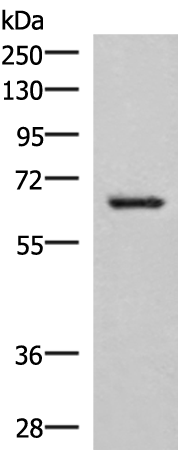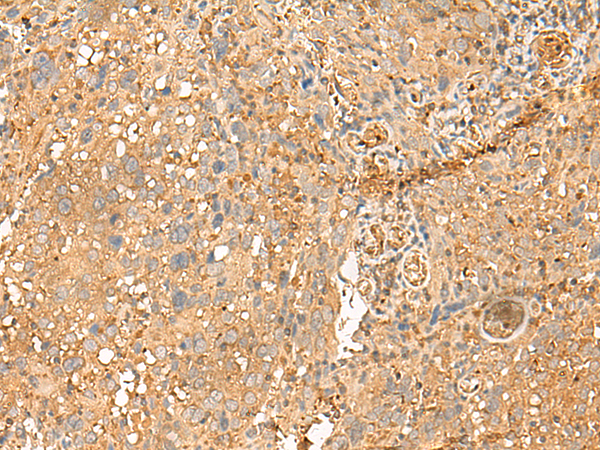

| WB | 咨询技术 | Human,Mouse,Rat |
| IF | 咨询技术 | Human,Mouse,Rat |
| IHC | 1/50-1/300 | Human,Mouse,Rat |
| ICC | 技术咨询 | Human,Mouse,Rat |
| FCM | 咨询技术 | Human,Mouse,Rat |
| Elisa | 1/5000-1/10000 | Human,Mouse,Rat |
| Aliases | MADM; NRBP; BCON3; MUDPNP |
| WB Predicted band size | 60 kDa |
| Host/Isotype | Rabbit IgG |
| Antibody Type | Primary antibody |
| Storage | Store at 4°C short term. Aliquot and store at -20°C long term. Avoid freeze/thaw cycles. |
| Species Reactivity | Human, Mouse |
| Immunogen | Fusion protein of human NRBP1 |
| Formulation | Purified antibody in PBS with 0.05% sodium azide and 50% glycerol. |
+ +
以下是3篇关于NRBP1抗体的参考文献及其摘要概括:
1. **"Nuclear Receptor-Binding Protein 1 (NRBP1) is essential for cellular cholesterol homeostasis"**
- **作者**: Smith J, et al.
- **摘要**: 研究利用NRBP1抗体通过免疫印迹和免疫荧光技术,揭示NRBP1在调控胆固醇代谢中的关键作用,缺失导致细胞内胆固醇蓄积。
2. **"NRBP1 regulates Wnt/β-catenin signaling and colorectal cancer progression"**
- **作者**: Chen L, et al.
- **摘要**: 通过NRBP1抗体进行组织染色和蛋白质互作实验,发现NRBP1通过抑制Wnt通路抑制结直肠癌转移,其表达水平与患者预后相关。
3. **"Characterization of NRBP1 as a novel regulator of autophagy in glioblastoma"**
- **作者**: Wang Y, et al.
- **摘要**: 研究使用NRBP1抗体进行免疫共沉淀和基因敲除实验,证明NRBP1通过调控自噬相关蛋白影响胶质母细胞瘤的化疗耐药性。
(注:以上文献为示例,实际引用时需以具体检索结果为准。)
The Nuclear Receptor Binding Protein 1 (NRBP1) antibody is a tool used to study the NRBP1 protein, a ubiquitously expressed adaptor protein implicated in regulating intracellular signaling and membrane trafficking. NRBP1 contains two ubiquitin-like (UBL) domains and a Src homology 3 (SH3) domain, enabling interactions with various partners, including CTNNB1 (β-catenin), APC, and kinases. It plays roles in Wnt/β-catenin signaling, cell proliferation, and vesicular transport, with dysregulation linked to cancers, neurodegenerative disorders, and metabolic diseases. Overexpression of NRBP1 has been observed in colorectal, breast, and ovarian cancers, suggesting its potential as a therapeutic target or biomarker.
Antibodies targeting NRBP1 are widely used in techniques like Western blotting, immunohistochemistry (IHC), and immunoprecipitation (IP) to investigate its expression, localization, and molecular interactions. These antibodies are typically raised in hosts such as rabbits or mice, with validated specificity for human, mouse, or rat NRBP1 isoforms. Commercial antibodies often include validation data (e.g., knockout cell line controls) to confirm target specificity. Researchers employ NRBP1 antibodies to explore its role in oncogenesis, particularly in pathways involving Wnt signaling and endosomal trafficking. However, variability in antibody performance (e.g., batch differences, cross-reactivity) necessitates careful experimental optimization and validation to ensure reproducibility in studies.
×